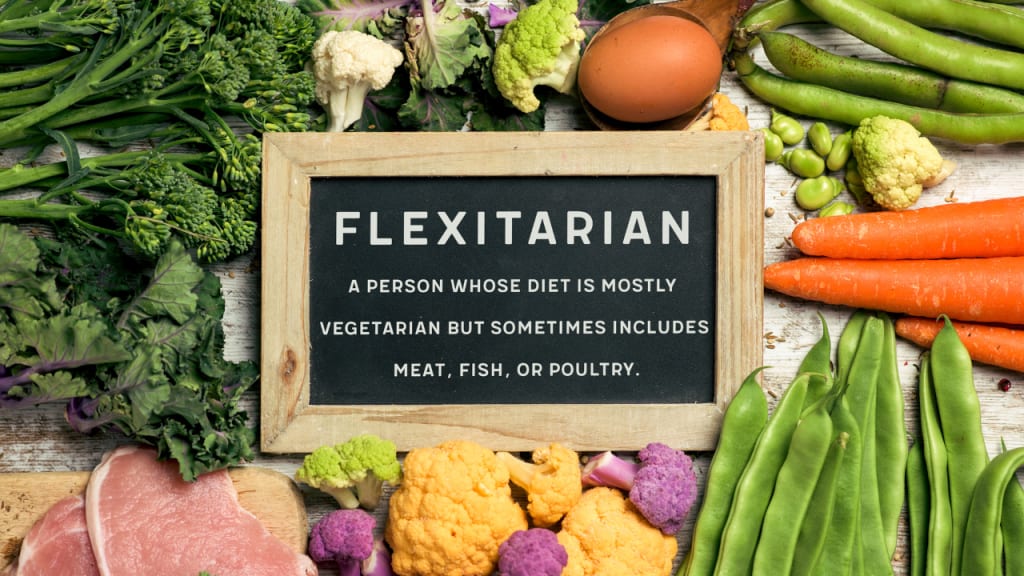
INTRODUCTION
The flexitarian diet is a flexible approach to eating that encourages primarily plant-based foods while allowing for occasional meat and animal products. The term "flexitarian" is a blend of "flexible" and "vegetarian," coined to describe a diet that is mostly vegetarian but includes meat and other animal products in moderation. This diet is designed to offer the benefits of vegetarianism while providing flexibility, making it more sustainable for many people.
HISTORY
The concept of the flexitarian diet has been around informally for years, as many people have naturally adopted a mostly plant-based diet without completely giving up meat. However, the term "flexitarian" gained popularity with the publication of "The Flexitarian Diet" by registered dietitian Dawn Jackson Blatner in 2009. Blatner's book outlines the principles of the diet and provides guidelines for incorporating more plant-based foods while still enjoying animal products in moderation. The diet has since gained widespread recognition for its balanced approach to nutrition and sustainability.
KEY COMPONENTS
- Plant-Based Emphasis: The diet focuses on increasing the intake of fruits, vegetables, legumes, whole grains, nuts, and seeds.
- Moderate Meat Consumption: Animal products are not entirely excluded but are consumed less frequently and in smaller portions. The emphasis is on quality over quantity, with a preference for lean meats, poultry, fish, and dairy.
- Flexibility: Unlike strict vegetarian or vegan diets, the flexitarian diet allows for personal preferences and flexibility, making it easier to adhere to.
- Balanced Nutrition: The diet aims to provide a balanced intake of macronutrients and essential vitamins and minerals. It encourages whole, minimally processed foods and limits added sugars, unhealthy fats, and highly processed foods.
- Sustainability: By reducing meat consumption, the flexitarian diet supports environmental sustainability, reducing the carbon footprint associated with meat production.
WHO SHOULD FOLLOW
The flexitarian diet is suitable for a wide range of individuals:
- Those Seeking a Healthier Diet: People looking to improve their overall health and nutrition can benefit from the increased intake of plant-based foods.
- Individuals Wanting to Reduce Meat Consumption: Those who want to cut down on meat for health, ethical, or environmental reasons but do not want to eliminate it entirely.
- Flexibility Seekers: Individuals who find strict diets challenging and prefer a more adaptable approach to eating.
- Chronic Disease Prevention: Those at risk of or managing chronic diseases like heart disease, diabetes, or hypertension may find the diet beneficial due to its emphasis on whole, nutrient-dense foods.
WHO SHOULD AVOID
While the flexitarian diet is generally safe and beneficial, it might not be ideal for everyone:
- Individuals with Specific Nutritional Needs: Those with specific dietary restrictions or medical conditions requiring strict control over certain nutrients should consult a healthcare provider before adopting this diet.
- People with Severe Allergies: Those with severe allergies to common plant-based foods, such as nuts or soy, might need to adjust the diet significantly.
- Individuals Requiring High-Calorie Diets: Athletes or those needing a high-calorie intake might need to ensure they get enough energy and protein from plant-based sources.
BENEFITS
- Improved Nutritional Intake: The diet promotes a higher intake of essential nutrients found in fruits, vegetables, whole grains, and legumes, which can improve overall health.
- Weight Management: Plant-based foods are generally lower in calories and higher in fiber, which can aid in weight loss and maintenance.
- Reduced Risk of Chronic Diseases: Diets rich in plant-based foods are associated with a lower risk of heart disease, diabetes, and certain cancers.
- Environmental Sustainability: Reducing meat consumption decreases the environmental impact associated with livestock farming, including greenhouse gas emissions, land use, and water consumption.
- Flexibility and Sustainability: The adaptable nature of the diet makes it easier for individuals to follow long-term, increasing the likelihood of sustained health benefits.
DISADVANTAGES
- Potential Nutrient Deficiencies: If not properly balanced, the diet might lead to deficiencies in certain nutrients commonly found in animal products, such as vitamin B12, iron, and omega-3 fatty acids.
- Planning and Preparation: A diet rich in plant-based foods can require more planning and preparation to ensure balanced meals and adequate nutrient intake.
- Eating Out Challenges: Finding suitable meal options when dining out can be challenging, particularly in places with limited vegetarian or plant-based choices.
- Adaptation Period: Some individuals may find it challenging to reduce meat consumption initially and may need time to adjust to new eating habits.
CONCLUSION
The flexitarian diet offers a balanced and flexible approach to eating that emphasizes plant-based foods while allowing for occasional consumption of meat and animal products. This diet is particularly appealing for those seeking the health and environmental benefits of a vegetarian diet without the strict restrictions. By promoting the consumption of whole, minimally processed foods and reducing meat intake, the flexitarian diet supports improved nutrition, weight management, and chronic disease prevention.
However, individuals considering the flexitarian diet should be mindful of potential nutrient deficiencies and ensure they are getting a balanced intake of essential vitamins and minerals. Consulting with a healthcare provider or nutritionist can help tailor the diet to meet individual needs and ensure it is sustainable in the long term. Overall, the flexitarian diet provides a practical and adaptable framework for those looking to make healthier, more sustainable food choices while enjoying the flexibility to include a variety of foods in their diet.
About the Creator
Enjoyed the story? Support the Creator.
Subscribe for free to receive all their stories in your feed. You could also pledge your support or give them a one-off tip, letting them know you appreciate their work.






Comments (1)
Hey, just wanna let you know that this is more suitable to be posted in the Longevity community 😊